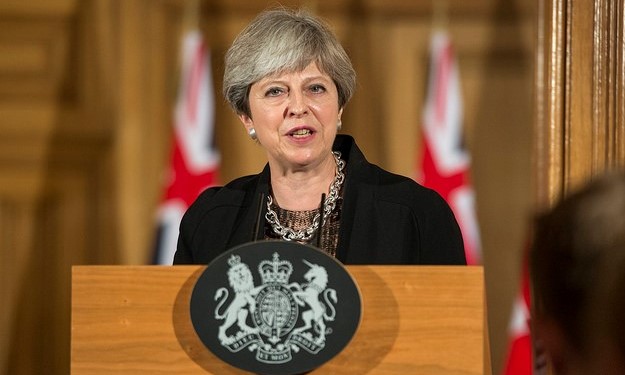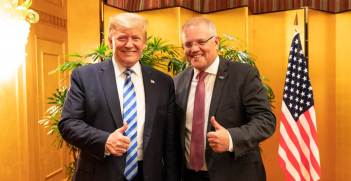Carry on Britain: A Closer Look at GE2017

Last month’s UK general election upended many of the assumptions previously made about UK politics. Now the focus is on what it will mean for Brexit’s trajectory and, closer to home, what it will mean for Australia-UK and Australia-EU relations.
History and the Conservative Party will not be kind to Theresa May. Her decision to call a snap election will go down in history as the greatest miscalculation by any British prime minister since last year.
This is not a glib point. It highlights the strains on the UK political system and the destabilising effects of austerity and Brexit. In other words, the patterns that politicians and political scientists use to help to make judgements and predictions have become harder to read in an age of rapidly changing political alignments. This is a cautionary tale for the Australian government as it seeks to recalibrate its relationship with the UK and the EU as Brexit plays out.
Reading the vote
This was a strange election. It was interpreted as a ‘win’ for Labour which won 56 seats fewer than its main rival yet whose leader was cheered to the rafters at the Glastonbury Festival days later. It was seen as a disaster for the Conservatives who gained 2.3 million more votes than in 2015 and increased their vote share to 42.4 per cent, a level not seen since Margaret Thatcher’s landslide in 1983. It felt like a major setback for the Scottish National Party (SNP) which won 35 out of 59 Westminster seats in Scotland, up from a mere 6 in 2010 but down from an unprecedented 56 in 2015.
The Democratic Unionist Party (DUP), a fire-and-brimstone party from Northern Ireland, found itself in a powerful position due to a ‘confidence and supply’ agreement with the diminished Conservatives at Westminster. Highly Eurosceptic (the EU was founded in Rome, after all), the DUP has exerted a strangely moderating influence on the tone of the Brexit negotiations following the election. Lastly, the UK Independence Party (UKIP) that helped win a historic victory totally out of proportion to its size in the Brexit referendum was condemned by its own success to a mere 1.8 per cent of votes, a drop of 10.8 per cent since the 2015 election. These figures defied everyone’s expectations, except YouGov, which was abused and ridiculed on social media for their accurate prediction.
Despite the irony of the outcome, it is seats in parliament that ultimately count and this is how Theresa May will be judged, not least by her own party. Calling an election was an understandable miscalculation. But the announcement caught almost everyone by surprise, and not just Brenda from Bristol. It surprised party activists in the constituencies, who were unprepared for another campaign and already stretched from multiple electoral contests recently, especially compared to their youthful and energetic counterparts in Momentum.
On the hustings
Thus, one of the assumptions overturned in 2017 was that campaigns don’t matter. Despite televised ‘debates’ and social media campaigns, face-to-face engagement is still crucial as UKIP showed in 2016. Theresa May can’t be blamed for her personality, but the judgement about running a presidential-style campaign around someone who wasn’t comfortable with such a role can be questioned. Nor was May helped by her manifesto because it harked back to the ‘nasty party’—an expression coined by May herself in 2002 as an auto-critique of the Conservatives—and alienated core support amongst older voters as well as those worn down by austerity. Policy U-turns mid-campaign meant that actions contradicted the infamous ‘strong and stable’ slogan.
Another assumption now being questioned is the idea that governments lose elections rather than oppositions winning them. But in voting for Corbyn’s Labour, were people voting for the man or the manifesto? Ad hominem attacks on Corbyn didn’t work; linking him to the IRA did not resonate with younger voters. Overall, Labour gains were made by votes from tertiary-educated Remainers and students. The Conservatives only gained votes from UKIP in places where there were relatively few graduates.
Another assumption consigned to the dustbin of history by GE2017 was that there were more pandas in Scotland than Tory MPs (there are two pandas in Edinburgh Zoo). The Conservative and Unionist Party gained 13 seats in Scotland, forcing the SNP to shelve plans for a second independence referendum. Some have hailed this as the most ‘British’ election since 1997, noting the apparent return of two-party politics. Between them, the Conservatives and Labour won 82 per cent of the total vote share. But it is too soon to write off nationalism just yet and Brexit has opened a new cleavage in British politics within and between the four nations.
The enervated Conservatives will want to delay another election for as long as possible. Theresa May—a “dead woman walking” according to George Osborne (the former Chancellor whom she sacked)—is a placeholder. The election didn’t create good conditions to maintain party cohesion with only 32 new MPs owing their election to May. Ironically the Fixed Term Parliaments Act that May ignored when calling the election might protect her for a while. But her best hope is that no one wants her difficult job. The Conservatives will want to resist calls when—not if—the new PM is installed to have his or her own mandate and spare their party workers yet another campaign.
Implications for Australia
Brexit now looks more precarious than it did six months ago. Parliament has reasserted itself in the face of the challenge to its sovereignty posed by the referendum and interpreted the election result as an anti-austerity and anti-hard Brexit vote. Yet despite the change of tone, Brexiteer-Anglosphere cabinet members remain in key ministries and May is at the time of writing sticking to the Lancaster House Speech as the basis for the UK’s negotiating position.
All this affects Australia. One of the first acts of the Turnbull government was to signal its willingness to negotiate a “quick” free trade agreement with a post-EU UK. Prime Minister Turnbull underscored this enthusiasm in London on 11 July 2017. Malcolm Turnbull said that “As Britain moves to completing its exit from the EU, we stand ready to enter into a free trade agreement with the UK as soon as the UK is able to do so… At the same time” he added, “we are looking forward to the early conclusion of a free trade agreement with the EU”.
Beginning, let alone concluding, long-awaited negotiations with the EU before March 2019 would be a start. The Australian government should proceed with caution here. It mustn’t underestimate the hurt that Brexit has caused in the EU and get caught up in what could be a messy divorce. Although often seen from Australia as a trading bloc, the EU is a political project that runs on political will. Australia must tread carefully.
The outcome of GE2017 should lead to a kinder, softer Brexit. May’s miscalculation has weakened the UK’s bargaining position in the Brexit negotiations and added further uncertainty, the inverse of the intention before the election. Insecure employment appears to be one of the defining features of our times, no less true for PMs as for Deliveroo riders. June may well turn out to have been the end of May after all. This only makes Australia’s relations with the UK and the EU during the Brexit negotiations all the more delicate.
Dr Ben Wellings is an author and lecturer in politics and international relations at Monash University. He is an expert on the politics of nationalism, Euroscepticism and Brexit in contemporary Europe.
This is an edited version of his remarks to AIIA VIC on 13 July.
This article is published under a Creative Commons Licence and may be republished with attribution.




